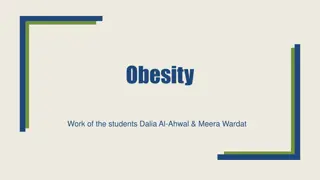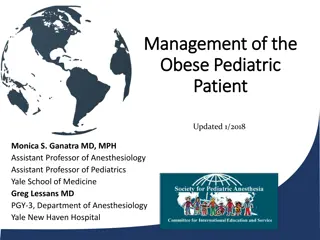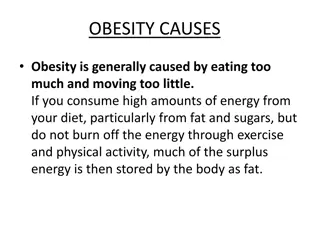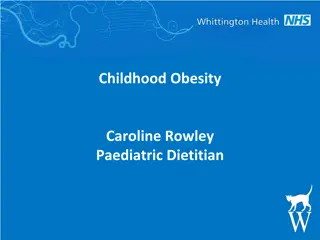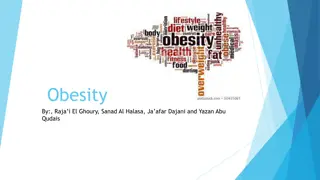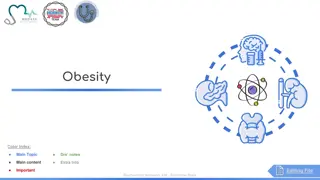Understanding Obesity and Its Consequences
Obesity is a serious medical condition characterized by an excess of body fat that can lead to various health issues such as heart disease, diabetes, and cancer. This article explores the symptoms, causes, consequences, and mental impacts of obesity, emphasizing the importance of prevention and management through healthy eating, physical activity, behavior therapy, and medication.
Download Presentation

Please find below an Image/Link to download the presentation.
The content on the website is provided AS IS for your information and personal use only. It may not be sold, licensed, or shared on other websites without obtaining consent from the author. Download presentation by click this link. If you encounter any issues during the download, it is possible that the publisher has removed the file from their server.
E N D
Presentation Transcript
OBESITY By: adnan halasa, faris sawalha, Jason wahhab , adam Abdullah.
What is obesity? An increased amount of body fat is a symptom of the severe condition called obesity. Obesity is more than simply a visual problem. It's a medical disorder that makes people more susceptible to heart disease, diabetes, high blood pressure, and several types of cancer.
What are some symptoms of obesity? More sweating Less confidence Snoring heavily Difficulty to breath Feeling tired Back and joint pain
What are the main causes of obesity? Most people become obese because of extra calorie intake. A lot of people have obesity in their genetics. Health conditions and medications can cause an increase of weight which leads to obesity
What are the consequences of obesity? Death low HDL cholesterol. high LDL cholesterol. Diabetes type 2. Strokes. Gallbladder illnesses.
What are the mental consequences of obesity? Depression Emotional and behavioral changes Low self-esteem Bipolar disorders
Why should obesity be solved? The fact that childhood obesity is more likely to persist into adulthood as a child gets older is one of the main reasons why obesity prevention in children is so important. This puts the person at high risk of diabetes, high blood pressure and heart disease.
How to solve obesity Healthy eating: Eating a balanced diet that is low in calories, fat, and sugar can help prevent and manage obesity. Physical activity: Regular physical activity can help burn calories, improve cardiovascular health, and prevent obesity. Behavior therapy: Cognitive-behavioral therapy can help people identify and change the behaviors that contribute to obesity. Medications: Medications can help people lose weight by reducing appetite or blocking the absorption of fat.
Resources: 1. https://www.mayoclinic.org/ 2. https://www.nichd.nih.gov/ 3. https://www.hsph.harvard.edu/obesity-prevention-source/obesity- prevention/#:~:text=Choosing%20healthier%20foods%20(whole%20grains,%2C%20and% 20other%20%E2%80%9Csit%20time%E2%80%9D 4. https://www.cdc.gov/healthyweight/effects/index.html 5. https://www.hopkinsmedicine.org/health/conditions-and- diseases/obesity/preventing- obesity#:~:text=A%20primary%20reason%20that%20prevention,blood%20pressure%20an d%20heart%20disease.








